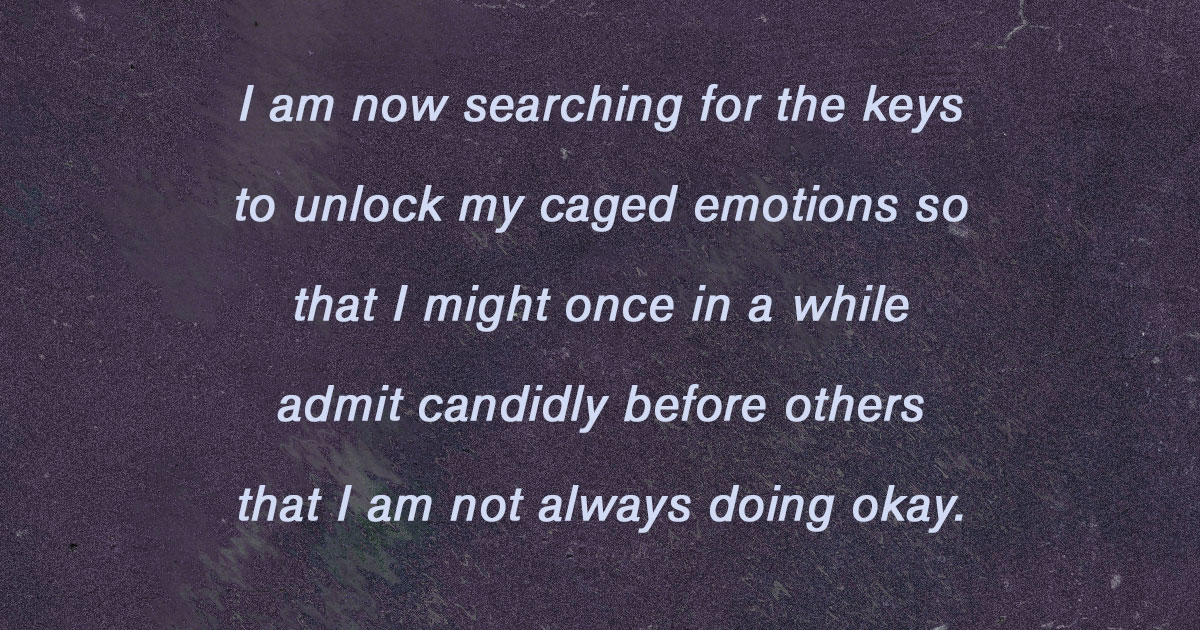I live life like the whole of it is a masquerade ball and the theme is happiness. I have the right collection of curated masks to don; every one of them concealing all the effects of anxiety and PMDD (premenstrual dysphoric disorder) in my life. I appear to float through life with a feather-like lightness, all caution thrown to the wind and with a sanguine and self-assured disposition. But that is all part of the contrived plan.
Well you see, it is an art I have learned from the best—the agents of my Indian upbringing such as parents, grandparents, aunts, uncles, cousins and so on. Behind closed doors, in a traditional Indian home such as mine, there is a popular mantra that goes along the lines of “What will people think about us?” In Tamil, there is even a saying that literally translates to “What will 4 people think about us?”
It is an obsession in our culture to conduct ourselves in a manner deemed acceptable according to community norms and unspoken rules. We vehemently seek the invisible stamp of approval from the people around us, committing ourselves to their expectations and policing our every move to ensure we measure up to the yardsticks.
This mantra is practiced in daily life and applies to the smallest of things.
For instance, I have memories from childhood of my brother throwing tantrums often. He would shed tears uninhibitedly as he would grab fistfuls of my mother’s skirt fabric and hide behind her in an attempt to seek comfort when situations that caused him distress arose. On the occasions that this happened during an extended family event and there were many onlookers, his behavior was met with visible disapproval.
Eyes would shift from him to me and I would hear praise for being the child who never cried, the child who never had a tantrum to throw, the child who never stepped out of line and stood within the boxes they drew up for me. I inscribed the message into every membrane of my being: nobody appreciates a display of your ugly emotions and it is best to keep it all contained if you want any bit of acceptance. Never mind that at that tender age, I desperately needed moments when I could have emotional outbursts unapologetically, be as candid about my needs and wants, and cry out for comfort when I needed it. Instead, I reeled it all in, for, what would people think.
The continuity of that in the grown up’s life is that I have a dichotomous existence as I battle emotional turbulence internally and yet do everything within my power to maintain a composed demeanor for the world to see and admire.
The dangerous aspect of that is that I am fueling my anxiety in the process. Because the thought of one day, inadvertently spilling the ugly emotions I have terrifies me so much, I am always a lot harsher on myself when I feel the onset of anxiety—the pounding of my heart against my chest, the loss of rhythmic breathing, the constriction of my throat, the sweaty palms, slight lightheadedness—and try to suppress it with force. That is quite the opposite of the assurance and comfort that my body, mind, and heart cry out for. I have had neither mercy nor grace to spare for myself. I have been the composer who demands that all of me dance to the tune I have set or self-flagellation is in order.
My heart aches a little when I think of how I have failed to acknowledge my own reality for so long and have sought to construct a false narrative. But now it occurs to me that there is absolutely no meaning in seeking acceptance from others when the starting point is not acceptance from one’s self.
I am now searching for the keys to unlock my caged emotions so that I might once in a while admit candidly before others that I am not always doing okay. And maybe, just maybe, it will be all right for me to be human.

allison lehenbauer
This was my story for many years and can relate completely. It used to feel like my family made me crazy. Now I understand, I’m lucky to be part of a generation who understand the value of openness and mental health. Sometimes I intentionally talk about what good things could happen or have happened when I’ve chosen to share certain things about myself with others, in front of elderly relatives. On one occasion my Grandma seemed both awed and baffled by what she was hearing. It seemed beyond her generation. I don’t think she will ever get help but I keep hoping I’m wrong.
Meghan
It is alright for you to human. ? All right. It is your reality. And mine. And we get to be human together. ?
Aimee
Tjis is all so true, even as we speak I am wearing said mask… I hate it so much when the mask starts to fade and then come the questions… But I realise that to get the proper help, that mask needs to vanish entirely. This post is a great inspiration and help in working towards that…. Thank you x
Tara
This is me. Thank you for sharing. Also struggling in getting help for my PMDD. Hugs. You aren’t alone.
Candice
Thank you for sharing Devi. This is so familiar. I was just writing about the “well-behaved” and “well-adjusted” child I was, myself—yet, not so well adjusted internally at all. It is a lonely and anxious place to exist as a child, and I am so sorry you had to experience it. There is hope for freedom in expressing our valid emotions and needs. Thank you, again, for sharing.